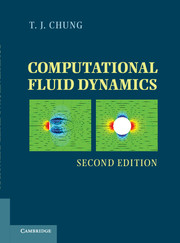Book contents
- Frontmatter
- Contents
- Preface to the First Edition
- Preface to the Revised Second Edition
- Part One Preliminaries
- Part Two Finite Difference Methods
- Chapter Three Derivation of Finite Difference Equations
- Chapter Four Solution Methods of Finite Difference Equations
- Chapter Five Incompressible Viscous Flows via Finite Difference Methods
- Chapter Six Compressible Flows via Finite Difference Methods
- Chapter Seven Finite Volume Methods via Finite Difference Methods
- Part Three Finite Element Methods
- Part Four Automatic Grid Generation, Adaptive Methods, and Computing Techniques
- Part Five Applications
- Appendixes
- Index
- References
Chapter Five - Incompressible Viscous Flows via Finite Difference Methods
from Part Two - Finite Difference Methods
Published online by Cambridge University Press: 05 June 2012
- Frontmatter
- Contents
- Preface to the First Edition
- Preface to the Revised Second Edition
- Part One Preliminaries
- Part Two Finite Difference Methods
- Chapter Three Derivation of Finite Difference Equations
- Chapter Four Solution Methods of Finite Difference Equations
- Chapter Five Incompressible Viscous Flows via Finite Difference Methods
- Chapter Six Compressible Flows via Finite Difference Methods
- Chapter Seven Finite Volume Methods via Finite Difference Methods
- Part Three Finite Element Methods
- Part Four Automatic Grid Generation, Adaptive Methods, and Computing Techniques
- Part Five Applications
- Appendixes
- Index
- References
Summary
General
The basic concepts in FDM and applications to simple partial differential equations have been presented in the previous chapters. This chapter will focus on incompressible viscous flows in which the physical property of the fluid, incompressibility, requires substantial modifications of computational schemes discussed in Chapter 4.
In general, a flow becomes incompressible for low speeds, that is, M < 0.3 for air, and compressible for higher speeds, that is, M ≥ 0.3, although the effect of compressibility may appear at the Mach number as low as 0.1, depending on pressure and density changes relative to the local speed of sound. Computational schemes are then dictated by various physical conditions: viscosity, incompressibility, and compressibility of the flow. The so-called pressure-based formulation is used for incompressible flows to keep the pressure field from oscillating, which may arise due to difficulties in preserving the conservation of mass or incompressibility condition as the sound speed becomes so much higher than convection velocity components. The pressure-based formulation for incompressible flows uses the primitive variables (p, vi, T), whereas the density-based formulation applicable for compressible flows utilizes the conservation variables (ρ, ρvi, ρE).
Information
- Type
- Chapter
- Information
- Computational Fluid Dynamics , pp. 106 - 119Publisher: Cambridge University PressPrint publication year: 2010
